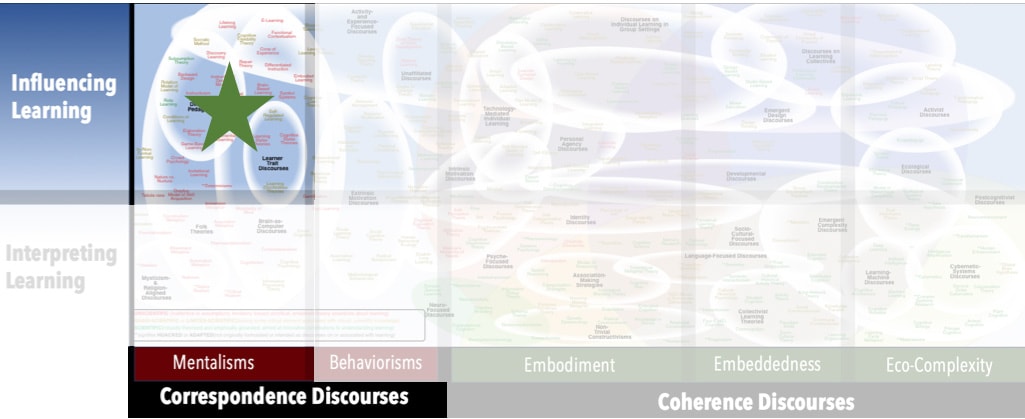AKA
Assimilation Theory
Meaningful Reception Learning
Reception Learning
Focus
Expository instructional strategies to support meaningful learningPrincipal Metaphors
- Knowledge is … established, external material
- Knowing is … integrated cognitive structure
- Learner is … an assembler (individual)
- Learning is … subsuming (incorporating what is new with what is already known)
- Teaching is … bridging (what is new to what is already known)
Originated
1960sSynopsis
Subsumption Theory is a perspective on expository instruction. It’s based on the assumption that meaningful learning – which, in this case, refers to learning that can be readily applied and reliably retained – can only happen if new content is related to what one already knows. Teaching advice includes that the most general concepts should be presented first and that presentations should blend new and familiar content. Prominent subdiscourses include:- Advance Organizer (Advanced Organizer) (David Ausubel, 1960s) – an overview, graphic, or other device that is presented at the start of a teaching episode with the intention of helping students relate new content to established understandings. Types of Advance Organizer include:
- Comparative Organizer – an Advance Organizer that draws a strong link (e.g., an analogy) between familiar content and new content
- Expository Organizer – a “preview” sort of Advance Organizer that focuses on core definition and/or generalizations
- Obliterative Subsumption (David Ausubel, 1960s) – when already-learned material cannot be recalled accurately because it has been subsumed into a broader concept
Commentary
Subsumption Theory was developed in the mid-20th century, when Behaviorisms were starting to lose their dominance as theories of learning among educational researchers, but while teaching was still assumed to be principally about delivery of material to passive learners. Subsumption Theory is founded on and infused with the Acquisition Metaphor, although a link was made to the Meaning-Making Metaphor.Authors and/or Prominent Influences
David AusubelStatus as a Theory of Learning
Subsumption Theory is not a theory of learning.Status as a Theory of Teaching
Subsumption Theory is explicitly a theory of instruction.Status as a Scientific Theory
There was a good deal of research on Subsumption Theory in the first few decades after it was proposed. Unsurprisingly, considerable evidence was assembled to support its premise that retention and application can be improved when teachers incorporate advance organizers and regular links to established knowledge. However, the failure to interrogate commonsense assumptions of learning (and, correspondingly, prevailing models of teaching) means that Subsumption Theory does not meet all our criteria of a scientific theory.Subdiscourses:
- Advance Organizer (Advanced Organizer)
- Comparative Organizer
- Expository Organizer
- Obliterative Subsumption
Map Location

Please cite this article as:
Davis, B., & Francis, K. (2023). “Subsumption Theory” in Discourses on Learning in Education. https://learningdiscourses.com.
⇦ Back to Map
⇦ Back to List
